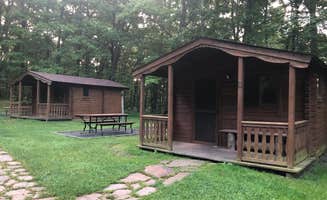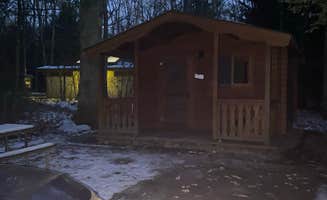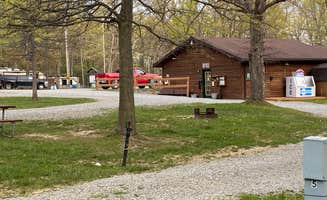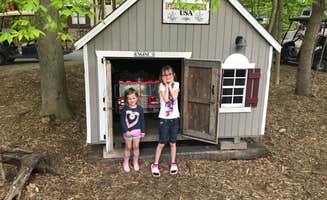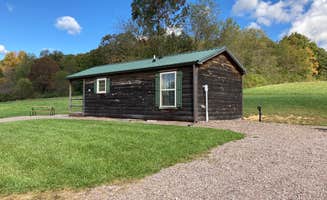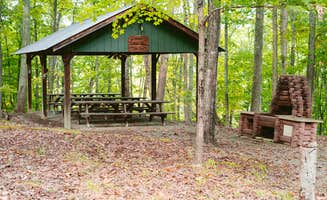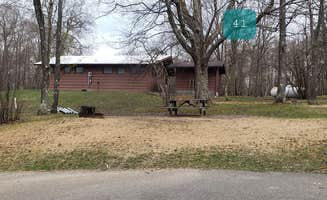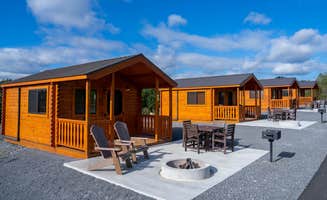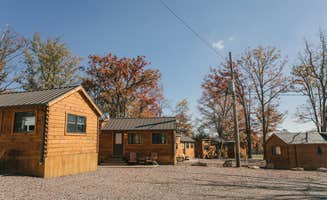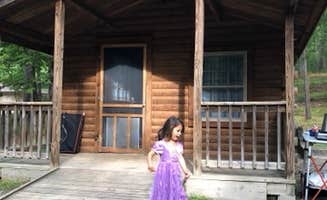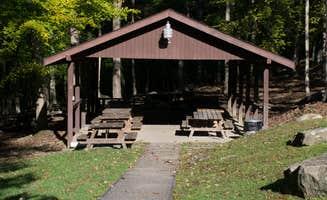Mchenry, Maryland sits at an elevation of 2,400 feet in the Allegheny Mountains, where summer temperatures average 10-15 degrees cooler than nearby urban areas. Fall camping season extends longer than in surrounding lowlands, with frost possible even in early September. Winter snowfall makes certain campgrounds inaccessible without four-wheel drive vehicles from November through April.
What to do
Hiking on waterfall trails: At Swallow Falls State Park Campground, explore multiple trail options with varying difficulty levels. "Swallow falls is awesome year round. In the winter the snow and ice is beautiful, fall is lovely and summer is fun," notes a camper. The park features Maryland's highest free-falling waterfall at 53 feet.
Historical site exploration: Visit the camping spot where Henry Ford, Thomas Edison, Harvey Firestone, and John Burroughs stayed in 1918 and 1921. "The trails are well kept. My kids love the swings and playground also," shares a visitor who frequents the park.
Star gazing opportunities: Clear mountain skies create excellent viewing conditions away from light pollution. "The sky was absolutely perfect to view from the campground - you could bring a telescope!" reports a camper at Blackwater Falls State Park Campground. The park's higher elevation provides improved atmospheric clarity compared to lower elevations.
Fishing in stocked waters: Multiple fishing spots available within walking distance of campsites. "You can fish there & they have kayaks to rent," explains one visitor about the lake facilities. Trout fishing remains productive into fall months when many other fishing areas slow down.
What campers like
Spacious campsites: Deep Creek Lake State Park Campground offers generous sites with practical amenities. "Each site also had a fire ring, lantern hook (but you would need to be much taller than me to reach it!), and very generous sized picnic table," notes a camper. Many sites include bear boxes at each location.
Clean facilities: Bathhouses receive regular maintenance throughout the camping season. "The bathrooms were quite possibly the cleanest camp bathrooms I've ever come across. Overall, I couldn't have asked for a better first experience there," shares a visitor describing their stay.
Wildlife viewing opportunities: "We had a raccoon visitor, and a black bear while we were there. The paths are littered with very docile deer and the lake is crystal clear," reports a camper. Evening firefly displays create natural light shows during summer months. "We were lucky enough to witness a spectacular light show put up by thousands of fireflies at night."
Varied accommodation options: From tent platforms to full hookup sites, options exist for different camping styles. "We stayed on site#40 in the Garrett Loop. It is one of only three FHU sites in this loop(the rest are primitive tent sites). The site was level, spacious, beautifully shaded, and convenient to the bath house," explains a visitor to Swallow Falls.
What you should know
Bear activity is common: Many campgrounds provide bear-proof storage containers at campsites. "Bears are common so they emplaced a big old bear box at every site. It's enough room to hold your food for a month of camping!" notes a visitor at Deep Creek Lake.
Limited cell service: Most campgrounds have minimal or spotty coverage. "No/very limited cell service" is common throughout the region, requiring preparation for offline navigation and communication.
Campsite selection matters: Kentuck Campground — Ohiopyle State Park requires careful site selection. "The campground itself was buggy, not well maintained, and covered in poison ivy," warns one camper, while others report excellent experiences in different sections.
Weather variability: Mountain weather changes rapidly with temperature swings of 30+ degrees in a single day. "Keep in mind, anytime after mid September can be quite cold overnight. But the foliage is totally worth it!" advises a visitor to Blackwater Falls.
Tips for camping with families
Look for playgrounds and activities: Yogi Bear's Jellystone Park Mill Run provides extensive family options. "This Yogi Bear campground offers a large waterpark area, large pool, monster truck rides and many activities. You don't have to leave to find something to do," shares a visitor. Children's programming runs through October with themed weekends.
Select family-friendly loops: Some campground sections cater specifically to families with quieter hours and bathroom proximity. "There are two main loops in this campground. One that is pet friendly and more of a pitch-your-tent-in-the-yard thing and another that is pet-free and wooded," explains a visitor about camping section differences.
Plan for local educational activities: Historical sites and nature centers provide learning opportunities. "The nature center by a small lake" offers wildlife exhibits and ranger programs explaining local ecology during summer months.
Pack for temperature swings: Mountain elevations experience colder nights than expected. Even summer camping requires warm clothing for evenings when temperatures can drop into the 40s after sunset.
Tips from RVers
Reserve hookup sites early: Yough Lake Campground at Tub Run offers a limited number of prime spots. "We camped here with our RV and boat. We stayed creekside to take advantage of the sewer connections," shares an RVer. Reservations for premium sites should be made 6+ months in advance for summer weekends.
Watch for leveling challenges: Many mountainside campsites require significant leveling blocks. "The site was sloped pretty bad side to side and there is a drop off on the one side of the fire ring so we could not sit completely around the fire," notes a camper at a local campground.
Prepare for mountain roads: Access routes often include steep grades and sharp turns. Some campgrounds aren't suitable for larger rigs. "Roads are all gravel so no bikes or scooters for kids," mentions one RVer describing access conditions.
Check electrical service details: Power availability varies significantly between campgrounds. "The electrical hookups are not played out well like an expensive RV park with the shared power post on the entrance side of the camper. You may want to have an extension for your power cable," advises an experienced camper.


